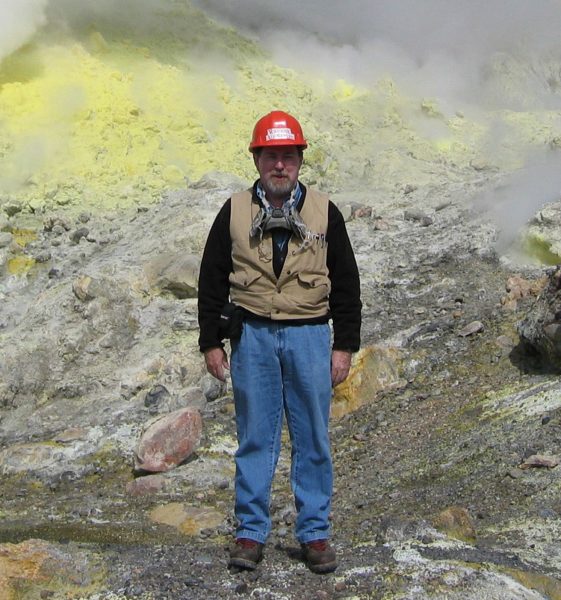Richard Kyle: Professor Emeritus
December 5, 2022
Thomas Quintero was out of his element. The Jackson School of Geosciences undergraduate student was winding through a series of dark, cold tunnels in a gold and silver mine in Slovakia in 2018.
The mine had been modernized and Quintero had gone through rigorous safety training, but he still found himself praying for the signal that the expedition was over. Then he looked over at his mentor, J. Richard Kyle, who was standing calm, his halogen headlamp shining from his mining helmet, his voice steady and relaxed. Quintero marveled at Kyle’s ability to ask probing questions of the locals and casually extract samples in that underground labyrinth.
“Despite quite literally traveling into the unknown, Dr. Kyle bravely allows his curiosity to guide his steps to the truth,” said Quintero, now a project manager and geographic information system (GIS) technician at Public Management Inc. “Throughout the rest of the time I spent with him … his scientific bravery and intellectual humility showed through.”
During his 44-year career at The University of Texas at Austin, Kyle served as the C.E. Yager Professor of Geology and a researcher with the Jackson School’s Bureau of Economic Geology. He traveled the world to better understand mineral deposits — how they’re formed, how to spot them, and ways for local communities to benefit from identified resources.
But it’s the work he did mentoring and advising students, from undergraduates to doctoral candidates, that Kyle remembers most fondly. During his career, he supervised more than
50 graduate and undergraduate thesis projects and helped guide countless other UT grads on their road to becoming professionals. Kyle served as both an undergraduate advisor and graduate advisor for the Department of Geological Sciences, and is now a graduate advisor for the Jackson School’s Energy and Earth Resources, a multidisciplinary master’s program. He taught courses on more than 20 different topics, most of which involved field studies and other practical aspects. And this year, the Society for Mining, Metallurgy & Exploration recognized Kyle’s long record of teaching both UT students and mining
industry colleagues by selecting him as the recipient of the 2023 Mineral Industry Education Award.
Kyle, who is now shifting from being a full-time professor to a part-time geological adviser at the bureau, decided to mentor students as a way to honor the many mentors he had as a student and young professional. After growing up on a family farm in Tennessee, Kyle said he never would have become the first in his family to go to college, or earn a doctoral degree, without that kind of help.
“It comes back to the issue of appreciating counsel and acting on the opportunities provided,” he said.
Kyle also developed a deep interest in diversifying the field of geology by focusing on students from underrepresented backgrounds in the U.S. and working closely with students doing research abroad. He has led more than 60 regional and international field trips, working with students in China, Indonesia, Brazil, Mexico, Chile, Scandinavia, Australia and elsewhere.
“When I started out, I had this idea that there are a lot of different cultures around the world, and it would be nice to contribute to the development of some younger people within those societies, and I would benefit from learning about another interesting part of the world and its peoples,” Kyle said.
As a researcher, Kyle focused on applied geosciences, particularly on the earth resources necessary to build, power and maintain cities and other critical infrastructure. Operating like a forensic scientist, Kyle studies each deposit’s origin within the region’s geologic history and creates a “blueprint” of identifying characteristics.
“This aids the collective effort to start looking around other parts of the region or the world to try to find similar geological settings and to hope that resource formation has come together in a similar fashion,” he said.
Having visited so many locations around the world, Kyle has also worked on ways to improve mineral extraction processes. For more than two decades, he has been working with colleagues on applying high-resolution X-ray computed tomography to ore deposits, which can analyze and present a 3D rendering of a rock sample without destroying it.
Describing the process as “Superman X-ray vision,” Kyle said such technologies not only aid in the understanding of these unusual rocks, but will help companies perform more targeted, efficient recovery of the contained resources. This ties into Kyle’s interests in adaptive reuse of former mine sites and repurposing mine wastes.
He has also spent years targeting critical minerals that will be used more frequently as societies shift to lower-carbon alternative energy sources. As the world weighs the trade-offs between using hard-to-find minerals required for low-carbon energy programs and the economic and environmental issues associated with those minerals, the field finds itself at a critical stage.
“It’s not just political will,” Kyle said. “It has a lot to do with the availability of the natural resources that will allow these engineering challenges to be met. It’s not a simple issue in any number of ways.”
As Kyle eases away from his full-time job, he’s looking forward to spending more time with his wife, Linda, and their two sons, Brock and Brett. He credits them for giving him the support he needed to do all the “crazy things” he did throughout his career.
Back to the Newsletter
